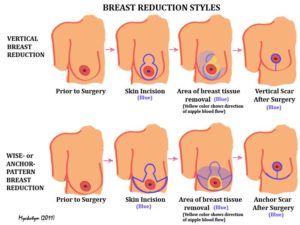If you have disproportionately large breasts that are causing neck pain, back pain, or other physical symptoms, you may be considering breast reduction surgery.
Most women who get breast reduction are very satisfied with the results. Men with conditions such as gynecomastia (in which male breasts are abnormally enlarged) may also get breast reduction.
Because it’s major surgery, you should know the benefits, potential complications, and what’s involved in recovery.
Your Consultation About Breast Reduction Surgery
Before breast reduction surgery, you will consult your surgeon. During your consultation, you’ll talk about your medical history, including whether or not you’ve had a lump removed from your breast or have any other medical conditions that affect your breasts. Your surgeon will also ask you about your family’s medical history.
Be completely open with the surgeon about your medical history and why you’re seeking a breast reduction. Be prepared to discuss any emotional issues you’ve dealt with regarding your breasts, how your breasts have physically felt to you, and any physical conditions you’ve had.
The surgeon may take photos of your breasts, measure them, and talk with you about how much breast tissue will need to be removed to achieve your goal. You will also learn about preparing for the surgery and planning for your recovery. You may get a mammogram and breast exam before the surgery.
During your consultation, your surgeon will ask about your habits, including whether or not you smoke and what medications you take. You may have to quit smoking for a period before and after surgery to ensure proper healing. You also may have to stop taking certain medications, such as aspirin or other anti-inflammatory drugs such as Motrin or Aleve. Your surgeon will give you instructions about what you need to do.

How to Prepare for Breast Reduction Surgery
You need to be in good physical shape to ensure proper healing, so follow your surgeon’s instructions before and after breast reduction surgery.
Before you undergo surgery, you’ll need to get your home ready for your recovery. Have these things on hand:
- Plenty of ice
- Gauze and clean washcloths and towels
- Loose, comfortable T-shirts and blouses
- Special ointments or creams as recommended by your surgeon for the incision sites
- You should also plan ahead for someone to drive you home and stay with you for at least the first night
- after the procedure, if you’re not staying in the hospital.
How Breast Reduction Surgery Is Done
Depending on your personal situation, breast reduction surgery can be done in an outpatient facility, or you may have to stay at least one night in the hospital. In either case, you will get general anesthesia, which means you will be put to “sleep” during the procedure.
Breast reduction surgery will take about two to five hours, sometimes longer. Your surgeon will make a cut around your nipple then downward on the breast in the form of a keyhole. The operating team will remove extra skin, tissue, and fat from your breasts and reposition your nipple. Your surgeon may use drainage tubes and then stitch up your breasts and wrap them in a special gauze. You may also need to wear a surgical bra.
Recovery From Breast Reduction Surgery
You will need to take at least one week off from work or school for breast reduction surgery. Some people need two weeks, but each situation varies. Your surgeon will instruct you on follow-up appointments for removing bandages and stitches.
While you recover, you’ll need to stop physical activity for at least one month after surgery.
After breast reduction surgery, you should expect to feel tired and to have breast pain. This is normal. Your surgeon will give you an oral painkiller to ease you through the first few days after surgery. You should also avoid heavy lifting.

